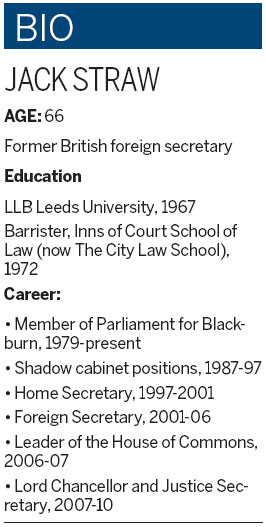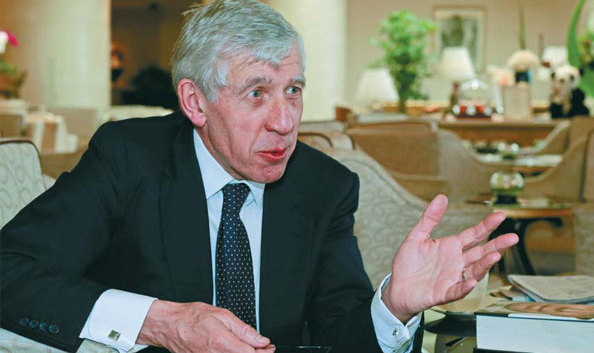China in the eyes of a man who 'gets it'
Updated: 2013-04-19 08:23
By Andrew Moody (China Daily)
|
||||||||
|
Jack Straw, who visits China in his role as consultant to E.D. & F. Man, believes Sino-Anglo relations are strong. Feng Yongbin / China Daily |
People continue to underestimate the significance of china's rise, says britain's former diplomat
Jack Straw believes China's foreign policy stance of nonintervention could be tested in the future.
Unlike the United States and the UK, the world's second-largest economy has never been keen on military interventions such as the Iraq War.
"I think there comes a point where it becomes very difficult (to not intervene). If your economic interests become threatened, it (China) may feel it necessary to take military steps to defend them," the former British foreign secretary says.
Straw, a lean and sprightly 66, was speaking over morning coffee at the five-star China World Hotel in Beijing. He was visiting China in his role as consultant to E.D. & F. Man, the British soft commodities trader.
Although the firm dates back to 1783, Straw says the firm never had any involvement in the opium trade that led to wars between the Britain and China in the 19th century. Their line is more sugar, coffee and molasses. "They weren't in the tea trade or the opium trade. It doesn't do in polite company to talk about how the Swires, Barings and the East India Company made their money, what?" he laughs.
Somewhat endearingly, Straw ends a number of his sentences with a Bertie Wooster-esque, "What?", perhaps an unusual verbal tic for someone steeped in British Labour Party politics.
China is no longer the vulnerable nation of the time of the Opium Wars and Straw acknowledges the rise of the country has been even more dramatic since he ceased to be foreign secretary seven years ago.
"This is one of the most extraordinary things about this place (the sense of progress). I have been here quite a number of times," he says.
He produces his passport, which has a diplomatic visa for 2005, when he made an official visit to Beijing. As with all UK passports, it carries a command from "Her Britannic Majesty's" foreign secretary for the bearer (in his case, the foreign secretary, himself) to be allowed to travel "without let or hindrance".
Straw, who might have been UK prime minister if one of the many plots to oust Gordon Brown had succeeded before the 2010 general election, says people in the West still underestimate the significance of the rise of China and how it will shape the world. Former UK prime minister Tony Blair has said people just "don't get it".
"I think Tony is right to say people don't get it. There is an insufficiency of historical understanding in the UK but more so in the US that China's position in the 19th and 20th centuries was in itself an aberration. Its position for most of what we describe as civilization was one of huge dominance."

He says it would be wrong also to assume the United States was about to suddenly decline as a superpower since its military spending is still about 10 times that of China.
"The US has just got into the habit of being the world's superpower and so much of its economy depends on that so I think it is going to be reluctant to give that up.
"From China's point of view defense is expensive and they have other things to spend their money on, as we know."
Straw was foreign secretary in the run-up to the Iraq War, the 10th anniversary of which fell a month ago, and in his recent autobiography, Last Man Standing, he writes about discussions he had with his Chinese opposite number on the UN Security Council, Tang Jiaxuan.
"I felt no hostility at any stage with my Chinese counterparts. They were very professional, skilled and clear about their position. They were detail people like me," he says.
In his book, he presents the case for the legality of the war and that Saddam's alleged weapons of mass destruction were not some invention by Blair or George W. Bush since all the intelligence pointed to him having them.
"They (Blair and Bush) have become demonized, and there is a view abroad that Tony lied. I know Tony Blair pretty well, and he is not a liar. My experience of government also is that it is very difficult to lie."
Many argue that the UN Security Council needs to be reformed. The current five permanent members - each with an individual veto are seen as representing a post-1945 and not 21st century world.
Some suggest Britain and France be replaced by EU representation and that emerging economic powers such as India be elevated.
"I have thought about this a lot. I think if you want the UN system to work, you have to accept the historical reality that there is a reason why the UK and France are serving as permanent members with veto powers," he says.
"If there was EU membership, it would be just hopeless. The inherent contradictions of the European Union have become more apparent, not least over the single currency."
Straw sees no problem with China's growing geo-political infl uence, particularly in Africa, and thinks it is unfair to suggest it is somehow now practicing neo-colonialism.
"Personally, I think it is profoundly unfair given the way in which Britain and, in particular, France, raped Africa. Our involvement was brutal and naked in the pursuit of power and wealth. I don't think we are in any position to make any loaded value judgment about China."
The African leaders he has spoken to welcome Chinese investment in infrastructure, which is transforming their economies, he says.
"What is the point the critics are making? That the West should own everything? ... If you have a country the size of China, with the demand it has for raw materials, what is it expected to do?"
This Western tendency to blame China has a long history, according to Straw. He quotes a 1927 article in the Blackburn Times in his book that blamed falling Lancashire exports on Chinese consumers. It said that owing to "war in China and the situation in India, (these) countries have not been doing their duty as consumers of late".
"It typified for me the approach the Brits took to the East. Absolutely extraordinary," he says guffawing.
He says he has always tried to cement good relations with the Chinese. When he was foreign secretary he invited the then Chinese ambassador Ma Zhengang to his Blackburn constituency who followed him on a factory visit and to a packed meeting at a local community center, where people went to air their complaints about "potholes and anti-social behavior".
"I introduced the police chief and the leader of the council and then said that this gentleman is the ambassador of China to the United Kingdom and there was spontaneous applause. They were really honored about the fact this man had turned up to hear their concerns."
(China Daily 04/19/2013 page24)

 Li Na on Time cover, makes influential 100 list
Li Na on Time cover, makes influential 100 list
 FBI releases photos of 2 Boston bombings suspects
FBI releases photos of 2 Boston bombings suspects
 World's wackiest hairstyles
World's wackiest hairstyles
 Sandstorms strike Northwest China
Sandstorms strike Northwest China
 Never-seen photos of Madonna on display
Never-seen photos of Madonna on display
 H7N9 outbreak linked to waterfowl migration
H7N9 outbreak linked to waterfowl migration
 Dozens feared dead in Texas plant blast
Dozens feared dead in Texas plant blast
 Venezuelan court rules out manual votes counting
Venezuelan court rules out manual votes counting
Most Viewed
Editor's Picks

|

|

|

|

|

|
Today's Top News
Boston bombing suspect reported cornered on boat
7.0-magnitude quake hits Sichuan
Cross-talk artist helps to spread the word
'Green' awareness levels drop in Beijing
Palace Museum spruces up
First couple on Time's list of most influential
H7N9 flu transmission studied
Trading channels 'need to broaden'
US Weekly

|

|








